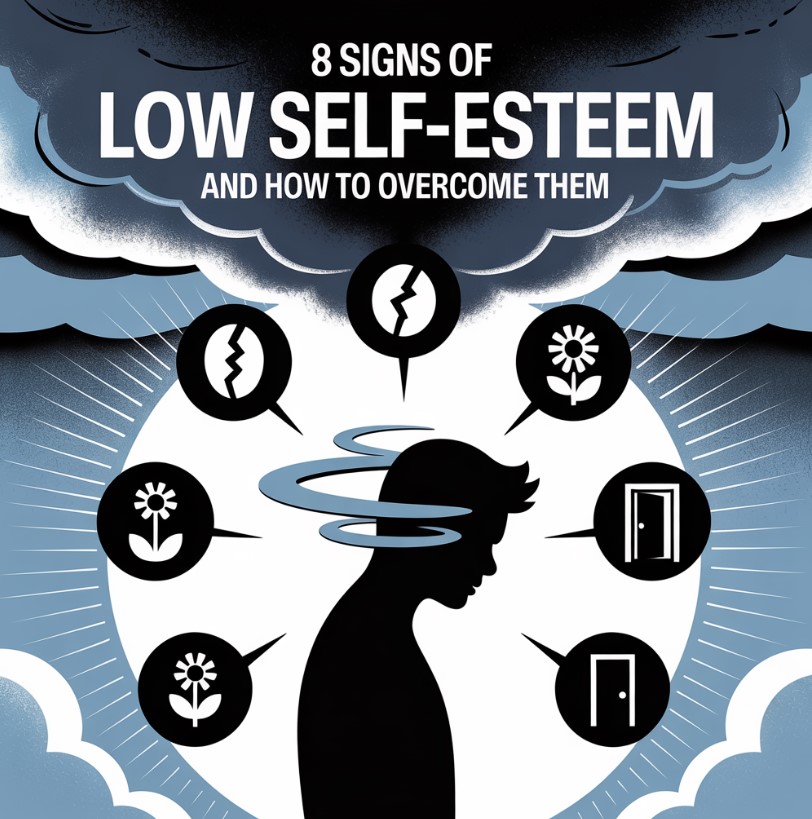8 Signs of Low Self-Esteem and How to Overcome Them

Contents
You can develop a healthier opinion of yourself and a more positive perspective on life by recognizing the signs of low self-esteem and taking the necessary steps.
People feel self-assured and motivated to face new challenges because they have a strong sense of self-worth. Low self-esteem over time can damage your relationships, self-perception, communication, and daily life management.
A person forms their self-esteem by thinking and feeling certain things about themselves, both consciously and unconsciously.
Psychological experts like Dr. Jan Roberts often observe that hidden thoughts and beliefs about oneself reveal low self-esteem.
Many different reasons can cause someone to experience low self-confidence:
- Parents and caregivers set specific hopes and standards for their children to follow throughout their childhood.
- Friends and loved ones influence the actions and decisions of a person because they want that person to feel accepted and included in the group.
- Relationships, including breakups or divorce
- Unresolved trauma
- Loneliness
- Internalized shame
- Certain mental health conditions
- Brain functioning and development
- Other societal and cultural messages
“People often remember and hold onto unpleasant experiences, memories, thoughts, and hurtful words spoken by others. We shape our thought patterns and influence how we interpret and understand everything around us by repeating messages,” Roberts explains.
“Over time, our beliefs and perceptions turn into the reality we live in. When we habitually think negatively, we view both the world around us and ourselves in a negative way. We develop low self-esteem when we view ourselves and our abilities negatively,” she says.
Do most people have low self-esteem? Not exactly.
Many individuals occasionally experience moments of self-consciousness or low confidence. Roberts asserts that people do not naturally experience low self-esteem and that it is not an inherent part of being human.
If you have negative feelings that continue for a long time, you should take action to improve your self-esteem.
Examples of low self-esteem
We can recognize low self-esteem by observing specific signs such as certain behaviors and situations that clearly show a person’s lack of confidence or negative self-image. Here are some examples:
You’re a people-pleaser
People sometimes prioritize gaining others’ approval instead of staying true to themselves and pursuing what genuinely brings them happiness.
When people have low self-esteem, they choose to act passively or express their dissatisfaction in indirect ways instead of directly standing up for themselves.
You feel needy or unworthy
Sometimes, a person tells themselves that they do not deserve love, compliments, or workplace benefits. How much you respect and believe in yourself influences how deserving you feel of good things. Negative core beliefs, such as thinking “I am not good enough,” “I am unimportant,” or “I am worthless,” lead people to feel unworthy, according to Clarke. People with low self-esteem often search for worthiness outside themselves, but Roberts reminds us that building true self-esteem and happiness requires looking within.
You struggle to build healthy relationships
When you value yourself more, you likely improve your relationships with others. Low self-esteem can cause your relationships to suffer. Low self-esteem makes it difficult for people to become close to others, trust their partners, and establish strong personal boundaries. Roberts warns that people with low self-esteem are more likely to stay in unhealthy, abusive, unbalanced, or codependent relationships.
You have a poor self-image
You judge your appearance negatively when you call yourself harsh names while looking in the mirror. Criticizing your appearance likely shows that you have a negative self-image and think poorly of yourself. Rejecting compliments often signals that you have low self-esteem. While you might reject compliments out of modesty, frequently doing so often shows that you don’t believe the positive things others say about you.
You experience negative self-talk
The speaker sees themself as a failure or someone who lacks value. The person denies themself happiness because they feel unworthy. The individual blames themself and thinks badly of themself after making a mistake. People who lack confidence talk to themselves in negative ways. People with low self-esteem constantly put themselves down. People with low self-worth harshly judge themselves for their mistakes.
You compare yourself to others
People compare themselves with others naturally. You can motivate yourself to improve and achieve goals by comparing yourself to others. You may harm your mental health if you compare yourself to others too often.
You experience self-doubt
People sometimes doubt their own decisions because everyone experiences uncertainty. When you frequently doubt yourself or seek others’ approval, you may have low self-esteem. Clarke explains that this low self-esteem can cause you to believe you will always fail and let fear control your life instead of facing challenges with confidence.
You avoid self-expression
People often choose not to express themselves because they feel ashamed, embarrassed, or fear being judged. Someone with low confidence usually holds back or “plays small.” Clarke explains that when people hide their true selves, they feel like outsiders and try to fit in by imitating others. People cope with insecurity by hiding their true selves or blending in with those around them.
How to grow confidence
If you identify with feelings of low self-esteem, you can stay calm because many effective methods help you build confidence and improve your self-perception.
Identify (and heal) the root cause
You overcome low self-esteem by committing to self-awareness and honesty, identifying the deep-rooted negative beliefs that past internalized messages have shaped, and understanding how these beliefs develop through cognitive processes, which allows you to change your thought patterns and adopt healthier perspectives on yourself and the world.
Set small goals
If you struggle with low self-esteem, you may feel powerless and unsuccessful, but when you set small, realistic goals—like noticing your negative self-talk or giving yourself compliments—you gradually build skills and confidence, which leads to bigger, positive changes in your life.
Be kind to yourself
People who think poorly of themselves judge their own actions more harshly than is fair. As you replace negative ideas and habits, show kindness and patience to yourself. Clarke explains that harsh self-criticism or pretending to feel positive does not solve the problem. Accept your feelings and yourself, and work toward positive growth instead of ignoring your feelings or feeling ashamed of them.
Practice self-love
Clarke explains that you must love yourself to have healthy self-esteem, because lacking self-love usually causes low self-esteem. You improve your well-being by building healthy habits and by getting to know and accepting your interests, flaws, and imperfections. Pretending everything is fine can harm you, but real positive thinking helps you see yourself more clearly; therefore, you should focus on your strengths instead of your weaknesses. Clarke suggests that you forgive yourself and use positive affirmations to heal and strengthen your self-esteem.
See a therapist
A therapist helps you recognize low self-esteem in your life and supports you in making positive changes. A therapist guides you in finding the root causes of your low self-esteem so you can heal, think differently, and build confidence. Therapists assist you in adopting new ways of relating to yourself and others that gradually improve your self-esteem. People focus on changing their thought patterns and developing new skills to depend less on others’ approval and realize they can improve their own self-esteem and well-being.
Next steps
You shape how you live and make decisions by the way you view and value yourself. You take an important first step toward positive changes when you recognize the signs of low self-esteem in yourself. When you demonstrate behaviors like poor boundaries, people-pleasing, negative self-talk, or feelings of unworthiness, you may experience low self-esteem. You can improve your poor self-image by learning its causes, practicing self-love, or consulting a mental health professional. You can build your confidence with time and effort, which helps you live a more fulfilling life.











